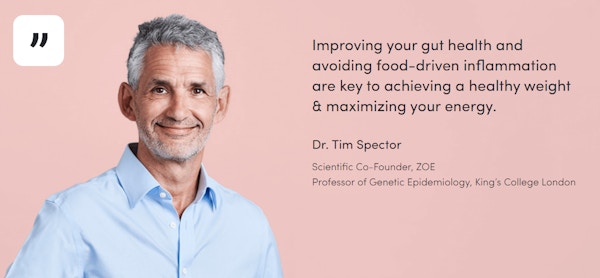And yet the reason he was able to be so light on his feet when it came to developing the app was not only because of his considerable expertise in and knowledge of disease at population level, but also because creating a health data-building app was not new territory for Spector. Far from it. Long before the Covid-19 pandemic broke out – some 28 years before, to be precise – he had been working with 14,000 sets of twins, studies of whom formed the basis of his development of the company he co-founded: Zoe. The accompanying app – which was repurposed for Covid data building within a mere week – was as ground-breaking as the work he has done during the pandemic. In terms of its long-term impact on our health, it may be all the more so.

Zoe, after all, aims to ‘analyse your unique gut, blood fat and blood sugar responses.’ It is, in short, being hailed as the future of weight loss and perhaps the greatest tool to tackle the growing obesity crisis. Meanwhile, its potential for helping to combat diabetes, heart disease and other chronic health problems could be truly game-changing. As its website notes, all of these are problems that are not going away. And, it argues, ‘Current approaches to address them view weight gain as the problem, rather than a symptom of poor metabolic health. They also treat us all the same, when in reality our bodies are all very different.’
Already launched in the US – it is promised in the UK at an unspecified date in 2022 – the testimonials are hard to argue with. And while dropping extra pounds is a common response for participants who have weight they want to lose, the programme is also advisable for anyone who wants to achieve optimal health. As they say, ‘Our science shows that everybody’s response to food is unique. Even identical twins. Your metabolism is not defined by your genes and it can change.’
The bespoke approach to the way in which we eat is inarguable when you consider that, as Zoe’s long-term studies show, even twins – the most genetically similar people on earth – can have very different responses to food. In fact, the data that Zoe has gathered reveals that there can be a tenfold variation in responses to the same meal. When faced with such figures, it is much harder to argue that all overweight people should simply reduce calories or stick to a whole food diet.
As one woman named Anita, cited as a Zoe success story explains, prior to entering the programme she spent a long time eating ‘clean’ and choosing the popularly advised good fats, only to pile on the weight. The problem? ‘It turns out my blood reacts more favourably to sugar than it does to fat. This was groundbreaking for me.’ For others, meanwhile, the benefits have included increased energy, as well as the feeling that they are finally in control of their bodies. It’s powerful stuff.
It is absolutely trailblazing work from Tim Spector and his team at Zoe, who make a habit of busting the myths that surround food, debunking claims ranging from the alleged power of ‘superfoods’ (alas, not substantiated) to the spurious and harmful claim that all calories are created equal (they are not). In fact, Tim, as an expert in gut bacteria, encourages us to eat more of certain foods that feed the microbiota, rather than less.
Part of what makes Tim Spector’s work so compelling is the joined-up nature of it. As he writes, his interests are wide and look at the whole picture. ‘I use the UK twins registry (TWINSUK) of 10,000 twins to pursue gene discovery in the common complex traits and diseases via genetic epidemiology. I study a wide variety of diseases from back pain to anxiety, snoring to sexuality. Our group focus on age related diseases such as CVD, metabolic traits, locomotor problems such as osteoporosis and osteoarthritis, cognitive function and eye disorders.’
And it is that wider picture, too, that connects the microbiome with Covid; it seems that the more diverse and thus healthier the microbiome, the more robust our immunity, which in turn accounts for that fact that in countries such as Britain and America, where nutritionally poor fast-food is widely consumed, long Covid rates have been particularly prevalent, whereas in places such as India, despite Covid being widespread, the fatality rate has been surprisingly low, even amongst the elderly. It certainly seems suggestive that gut microbes have a large role to play in combating not just our weight and general wellbeing, but our response to disease.
This month, then, when all sorts of conflicting diet advice is peddled as is customary in January, perhaps this is the year to take a deep breath and resist the ‘experts’, and instead await the arrival of an app that has its basis in almost three decades-worth of rigorous medical research and will address your body’s nutritional needs on an individual basis. When it comes to Zoe’s arrival in the UK, we’ll be first in line.
Sign up for updates from Zoe here, and to be on the waiting list when it launches in the UK.
Buy Tim Spector’s excellent books, Spoon Fed, The Diet Myth and Identically Different: Why You Can Change Your Genes here.
January 2022
By Nancy Alsop
READ MORE:
7 Healthy Comfort Food Suppers
Why Nutrition & Fresh Air Are So Important When You Get Covid
7 Nutritionists on Instagram To Transform Your Wellbeing


